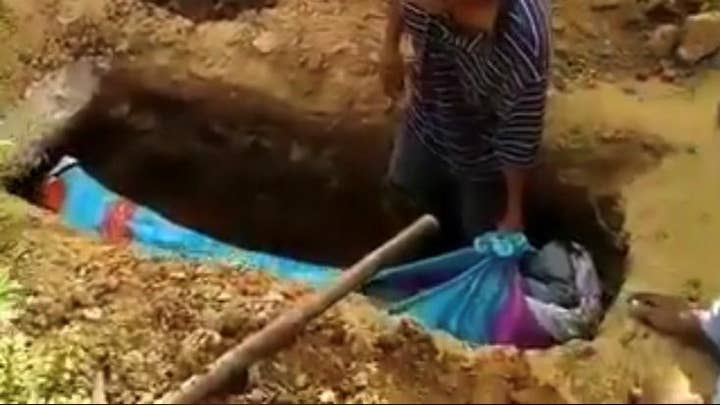
Venezuela's President Nicolas Maduro, center, stands with his Defense Minister Vladimir Padrino Lopez before giving his annual address to the nation to members of the Constitutional Assembly inside the National Assembly in Caracas, Venezuela, Monday, Jan. 14, 2019. (AP Photo/Ariana Cubillos)
Leaders of Venezuela’s opposition movement are moving forward with a plan to oust President Nicolas Maduro, declaring his presidency is “illegitimate” and inching toward creating a caretaker government until new elections can be held.
The news comes as Vice President Mike Pence said Tuesday he had spoken by phone to Venezuelan opposition leader Juan Guaido and expressed support for him.
PENCE: 'NO DEAL' WITH DEMS WITHOUT BORDER WALL FUNDING, TRUMP 'EVALUATING' AFGHANISTAN PULLOUT
“The Vice President firmly emphasized that the long-standing goal of the United States and all freedom-loving nations is to restore democracy to Venezuela through free and fair elections, and end the unprecedented humanitarian and economic crises in the once-rich cradle of Bolivar,” Pence’s office said in a statement. “Vice President Pence encouraged Mr. Guaido to build unity among political groups, and pledged continued support from the United States until democracy is restored.”
Pence also took to Twitter to state that the U.S. “strongly supports the courageous decision by Juan Guaido” to “declare the country’s presidency vacant.”
Officials from the White House, the National Security Council and State Department spent the weekend working on an official response which included recognizing Guaido, issuing harsh sanctions on Venezuela’s oil industry as well as what to do if Maduro actually leaves.
“There was a real kind of ‘OK, we dropped the ball here, by not taking this date seriously, but we need to catch up quickly and figure out what we can do,’” a person involved in the discussions told McClatchy news service.
Venezuela’s congress passed declarations finding Maduro’s rulings invalid and is offering amnesty to members of the military who will help restore “constitutional order.” They believe that Maduro’s second term, which began Jan. 10, is illegitimate and accuse him of “usurping” power.
Venezuela watchers say the time to challenge Maduro has come.
“It’s almost a now-or-never moment,” Fernando Cutz, a former senior White House official who helped shape Venezuela policy under the Trump and Obama administration, told The New York Times.
But trying to oust Maduro is easier said than done.
Guaido said last week that he is ready to step into the presidency temporarily and call for new elections, but only if he sees support from the military and common Venezuelans in nationwide street demonstrations set for later this month.
The resolution adopted Tuesday laying out a roadmap for a political transition led by the National Assembly came amid a frenzy of legislative activity. Among other measures approved was the one aimed at weakening military support for the president.
Maduro has cultivated a stronghold within the military by appointing generals to powerful government posts as Venezuela collapsed into a historic economic and political crisis, creating steep challenges for the anti-Maduro politicians.
“It’s not going to be simple after 20 years of repression,” Guaido said about the military.
Diego Moya-Ocampos, a Venezuela analyst with the London-based consulting firm IHS Global Insight, said the military would be a key player behind the scenes to drive any regime change. The opposition is offering the armed forces incentives to break away rather than continue supporting Maduro, he said.
VENEZUELA, IRAN AND HEZBOLLAH - ALL HOSTILE TO THE US- FORGE CLOSER TIES
“They’re laying the institutional grounds for both the military and the police in an eventual transition,” Moya Ocampos said. “It gives them incentives to defect rather than to collaborate with the Maduro regime.”
But so far there is little sign that support within the top ranks of the armed forces is fraying.
Defense Minister Vladimir Padrino Lopez said Tuesday that he was “worried” about attempts to subvert the constitution not by Maduro but his opponents.
“We must tell the Venezuelan people every day that the Bolivian Armed Forces deeply love the ideas of the commander Hugo Chavez,” he said standing alongside Maduro, referring to the president’s mentor and predecessor.
Maduro has largely ignored Congress, arguing that it is outranked by a pro-government constitutional assembly. The pro-Maduro Supreme Court earlier ruled that acts of the opposition-dominated Congress are invalid.
“Anyone who wants to mock the constitution and play politics, well, he’ll have to face the constitution, the laws and the courts,” Maduro said without mentioning Guaido. “The courts will put things in their place as always.”
CLICK HERE TO GET THE FOX NEWS APP
Congress also approved a resolution calling on dozens of foreign governments to freeze bank accounts controlled by Maduro’s government to protect assets that legislators say belong to the Venezuelan people and which are being squandered through corruption and mismanagement.
Maduro's reelection was only recognized as legitimate by Venezuelan allies such as Cuba, Nicaragua, China, Russia and Syria.
The Associated Press contributed to this report.









































